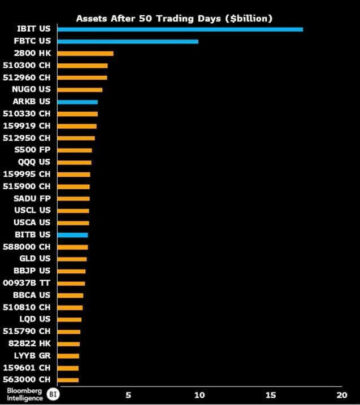
In an in-depth interview with Bitcoin Magazine on Jan. 24, Bitcoin Core developer Luke Dashjr voiced significant concerns about the increasing centralization of Bitcoin mining.
Dashjr believes that the dominance of a few large mining pools poses a serious threat to the decentralized nature of Bitcoin, potentially leading to censorship and control issues within the network.
11 mining pools in control
Dashjr said that a handful of large mining pools currently dominate Bitcoin mining and provide the vast majority of the computing power used to secure the Bitcoin network.
These pools can vary in their respective total network hash rate shares. Some notable mining pools often include AntPool, Foundry USA, F2Pool, Poolin, and Binance Pool, among others. The exact distribution changes over time due to various factors, such as changes in pool capacities and the emergence of new mining pools.
The crux of Dashjr’s concerns lies in these pools’ disproportionate influence over the blockchain. He argues that this centralization could allow these entities to exert undue influence on which transactions are confirmed, thereby undermining one of Bitcoin’s key value propositions — censorship resistance.
Dashjr said that Ocean Mining was launched to counter some encroaching centralization in Bitcoin mining. Ocean aims to shift the balance of power from a few large pools to individual miners by enabling them to create their blocks.
Dashjr states this approach would foster a more democratic and decentralized mining process, where decisions are not centralized within a few powerful entities. He emphasized that while decentralization is challenging, especially given the natural tendency toward centralization for efficiency and profit, it is essential for the health and integrity of Bitcoin.
Energy consumption
The interview also touched on the often debated topic of Bitcoin’s energy use.
Dashjr compared the energy consumption of Bitcoin mining to everyday appliances, such as clothes dryers, to provide perspective on its energy demands. He argued that the value and principles offered by a decentralized cryptocurrency like Bitcoin must be considered against its energy consumption.
Dashjr discussed potential future applications of Bitcoin, suggesting that its relevance and utility continue to grow in various sectors. He indicated that Bitcoin’s evolution is an ongoing process, with its store of value and remittance capabilities paving the way for broader use as a currency.
Dashjr emphasized the need for better accessibility, user interfaces, and education in the Bitcoin ecosystem to encourage wider use and understanding of its features, including the importance of validating transactions against full nodes.
- SEO Powered Content & PR Distribution. Get Amplified Today.
- PlatoData.Network Vertical Generative Ai. Empower Yourself. Access Here.
- PlatoAiStream. Web3 Intelligence. Knowledge Amplified. Access Here.
- PlatoESG. Carbon, CleanTech, Energy, Environment, Solar, Waste Management. Access Here.
- PlatoHealth. Biotech and Clinical Trials Intelligence. Access Here.
- Source: https://cryptoslate.com/bitcoin-developer-luke-dashjr-raises-concerns-over-centralization-in-bitcoin-mining/
- :is
- :not
- :where
- 24
- a
- About
- accessibility
- against
- aims
- allow
- also
- among
- an
- and
- Antpool
- appliances
- applications
- approach
- ARE
- argued
- Argues
- AS
- Balance
- BE
- believes
- Better
- binance
- Binance Pool
- Bitcoin
- bitcoin core
- Bitcoin Developer
- Bitcoin Magazine
- Bitcoin mining
- Bitcoin Network
- blockchain
- Blocks
- broader
- by
- CAN
- capabilities
- capacities
- Censorship
- Censorship Resistance
- Centralization
- centralized
- challenging
- Changes
- clothes
- compared
- computing
- computing power
- Concerns
- CONFIRMED
- considered
- consumption
- continue
- control
- Core
- core developer
- could
- Counter
- create
- crux
- cryptocurrency
- Currency
- Currently
- Decentralization
- decentralized
- decisions
- demands
- democratic
- Developer
- discussed
- disproportionate
- distribution
- Dominance
- dominate
- due
- ecosystem
- Education
- efficiency
- emergence
- emphasized
- enabling
- encourage
- energy
- Energy Consumption
- entities
- especially
- essential
- everyday
- evolution
- f2pool
- factors
- Features
- few
- For
- Foster
- Foundry
- Foundry USA
- from
- full
- future
- given
- Grow
- handful
- hash
- hash rate
- he
- Health
- HTTPS
- importance
- in
- in-depth
- include
- Including
- increasing
- indicated
- individual
- influence
- integrity
- interfaces
- Interview
- issues
- IT
- ITS
- Jan
- jpg
- Key
- large
- launched
- leading
- lies
- like
- magazine
- Majority
- Miners
- Mining
- Mining Pools
- more
- must
- Natural
- Nature
- Need
- network
- New
- nodes
- notable
- ocean
- of
- offered
- often
- on
- ONE
- ongoing
- Others
- over
- Paving
- perspective
- plato
- Plato Data Intelligence
- PlatoData
- pool
- Poolin
- Pools
- poses
- potential
- potentially
- power
- powerful
- principles
- process
- Profit
- propositions
- provide
- raises
- Rate
- relevance
- Remittance
- Resistance
- respective
- Said
- Sectors
- secure
- serious
- Shares
- shift
- significant
- some
- States
- store
- store of value
- such
- that
- The
- their
- Them
- thereby
- These
- this
- threat
- time
- to
- topic
- Total
- touched
- toward
- Transactions
- understanding
- USA
- use
- used
- User
- utility
- validating
- value
- various
- vary
- Vast
- was
- Way..
- which
- while
- wider
- with
- within
- would
- youtube
- zephyrnet











